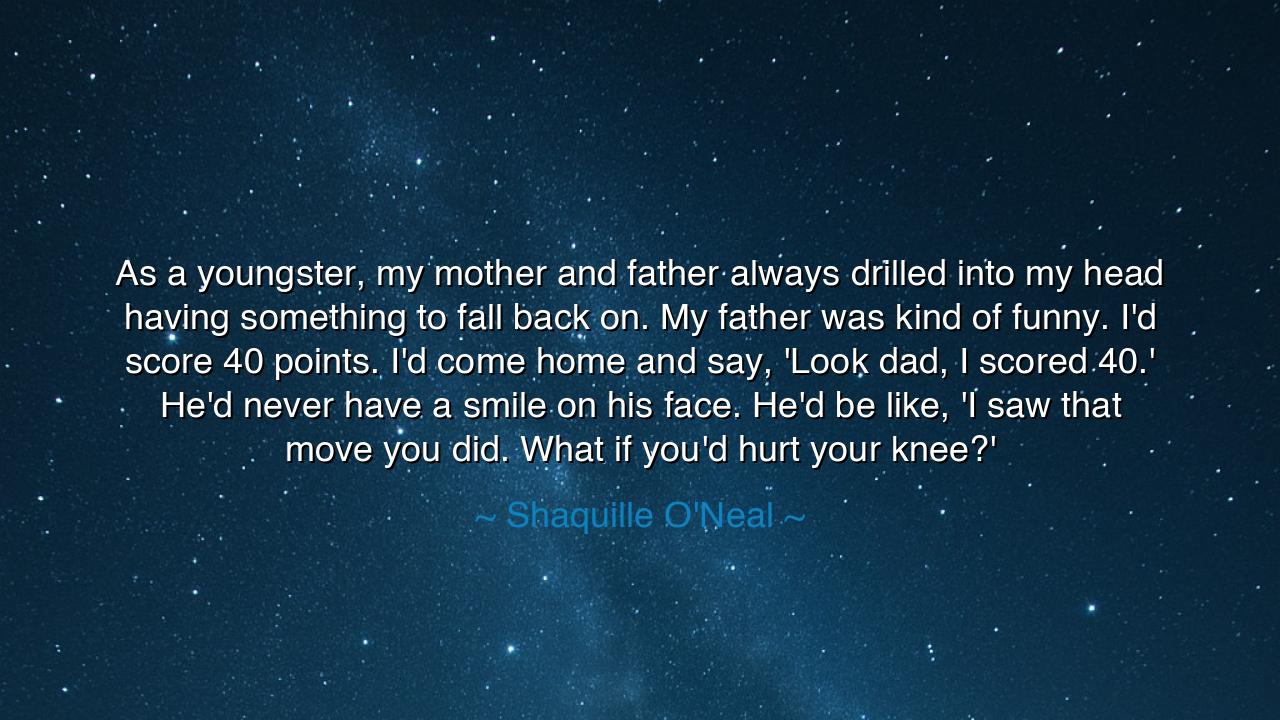
As a youngster, my mother and father always drilled into my head
As a youngster, my mother and father always drilled into my head having something to fall back on. My father was kind of funny. I'd score 40 points. I'd come home and say, 'Look dad, I scored 40.' He'd never have a smile on his face. He'd be like, 'I saw that move you did. What if you'd hurt your knee?'






The words of Shaquille O’Neal carry within them a truth that echoes across the ages: the triumphs of youth are fleeting, but the foundation of character endures. When he recalls how his father, rather than rejoicing in his son’s 40-point conquest on the court, cautioned him with the thought of a broken knee, he reveals the wisdom of the ancients—that glory is fragile, and the wise soul prepares for storms even when skies are clear. This is not a dismissal of achievement, but a reminder that victory without foresight is as sand cast upon the wind.
In this teaching, one hears the eternal voice of parents who, like sculptors of stone, shape their children not merely for the brightness of today, but for the endurance of tomorrow. Shaquille’s father planted the seed of prudence: the lesson that man must always have “something to fall back on.” For the flame of talent may burn bright, but it is subject to the winds of fate. Fortune’s wheel turns swiftly, and what is given today may be taken on the morrow. Thus, the father spoke not to dampen his son’s joy, but to bind him with the armor of resilience.
History too bears witness to this eternal wisdom. Consider the tale of Marcus Aurelius, the philosopher-emperor. Though crowned with power, he wrote his Meditations in the solitude of camp tents, reminding himself that the empire could crumble, that wealth and command were but passing shadows. He trained his mind to fall back on virtue, not the brittle ornaments of power. And so, when trials came—plagues, wars, betrayal—he did not collapse, but stood firm upon the foundation he had cultivated. Like Shaquille’s father, Aurelius whispered across time: prepare not only for triumph, but for the test of its loss.
The story of O’Neal’s father’s stern face carries another hidden jewel: the reminder that discipline is a greater gift than praise. A father who smiles too quickly may leave his child unprepared, lulled into believing that strength is invincible. But the father who questions, who warns, who calls forth humility even in victory—such a father forges steel in the heart of his child. For it is in the shadow of caution that true strength grows, where a man learns that his worth is not in numbers scored, but in the wisdom to endure when numbers no longer come.
And yet, there is no bitterness in this counsel. Rather, it is the call of love in its highest form—a love that does not merely celebrate, but safeguards. The father sees beyond the game, beyond the cheers, into the quiet years that follow. He speaks as a sentinel, watching the road ahead, urging his son to guard against the snares of pride and the cruelty of chance. This is the love that seeks not to flatter, but to preserve.
The lesson for us, children of later generations, is clear: we too must build our fallback, our second fortress. Not merely in wealth or possessions, but in skill, in knowledge, in virtue. For the body may fail, but the mind may endure; the career may collapse, but character remains as a lamp in darkness. Thus, let each soul cultivate a craft beyond their craft, a wisdom beyond their skill, a faith beyond their fortune.
In practice, this means we must live with foresight. The student should study not only for grades, but for understanding. The worker should labor not only for wages, but for the growth of their hands and mind. The dreamer should pursue passion, yet weave within it the thread of adaptability, lest a single broken step end the dance. Build therefore, not one tower but two, that when one falls, you yet have shelter.
So, let this teaching of O’Neal’s father be etched into your heart: celebrate your victories, but temper them with preparation. Rejoice in the light, yet never forget the night may come. If you do so, you will not fear the turning of fate’s wheel, for you shall stand as a fortress with many walls. And when your children look to you, you too may teach them: “My child, glory is fleeting, but wisdom endures. Build always something to fall back on.”






AAdministratorAdministrator
Welcome, honored guests. Please leave a comment, we will respond soon